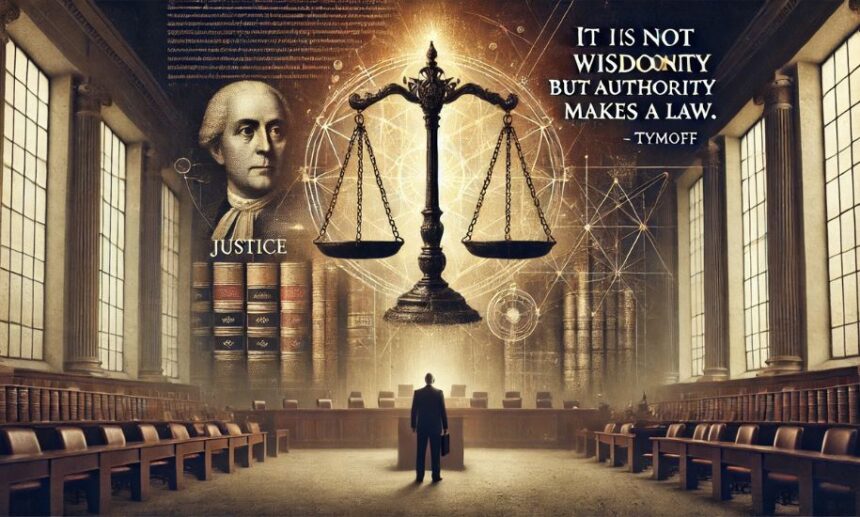In today’s legal and philosophical discussions, the balance between wisdom and authority remains a topic of deep reflection. The quote “it is not wisdom but authority that makes a law. t – tymoff” opens up a discourse on how laws are formulated, enforced, and sustained. On the surface, wisdom appears to be the guiding light of lawmaking. However, this quote challenges that notion, emphasizing the power of authority over wisdom when it comes to enforcing societal regulations. As we dive deeper into the meaning behind “it is not wisdom but authority that makes a law. t – tymoff,” we must explore the dynamics between legal authority, governance, and the role of wisdom.
In this article, we’ll break down the phrase’s meaning and the broader implications it holds in our modern society. We’ll also explore examples that demonstrate the dominance of authority over wisdom in the context of law, and how this manifests in both historical and contemporary scenarios. Here at Baddie Hun, we aim to provide a fresh perspective on such intriguing topics, and this analysis serves as yet another step in that direction.
The Core Concept: “It is Not Wisdom but Authority that Makes a Law. T – Tymoff”
At first glance, this quote suggests that authority holds the upper hand when it comes to establishing and enforcing laws. The phrase “it is not wisdom but authority that makes a law” posits that while wisdom might guide the principles of law, it is ultimately the power of authority that dictates which laws are created and followed. Wisdom, although valuable, does not possess the same control over society’s rules as authority does.
This distinction highlights a crucial aspect of governance. In democratic or authoritarian systems, authority acts as the bedrock of lawmaking. While the collective wisdom of society might point to certain ethical standards or rational laws, those ideals can only be implemented if there is authority backing them. Without the force of authority, wisdom remains an unexecuted idea.
Historical Context: Authority Over Wisdom in Law
Throughout history, there have been numerous examples where authority supersedes wisdom in the creation of laws. One notable period is during the reign of monarchs and emperors. In these times, laws were often decrees issued by a singular figure—usually an authoritative ruler—regardless of whether the law reflected the collective wisdom of society.
For example, during the reign of King Louis XIV of France, his famous proclamation “I am the state” exemplified the sheer dominance of authority over any form of democratic wisdom. Although the kingdom housed scholars and advisors capable of offering wisdom, it was the king’s authority that defined the laws of the land.
In more contemporary examples, we can observe totalitarian regimes that have implemented laws that are often counterintuitive to societal wisdom. Yet, these laws exist and are followed because of the centralized authority that backs them. Baddie Hun examines these patterns in history, encouraging readers to think critically about how authority molds society’s legal systems.
The Role of Wisdom in Modern Lawmaking
Although the quote highlights the precedence of authority, it is important not to downplay the role of wisdom entirely. Wisdom often forms the backbone of legal principles, guiding the formation of just and moral laws. In modern democratic societies, for instance, legal systems strive to incorporate both wisdom and authority.
Lawmaking bodies, such as parliaments or congresses, consult with experts and scholars in fields ranging from ethics to economics. These consultations are designed to inject wisdom into the laws being drafted. However, even with such wisdom, the final laws are passed and enforced through the use of authority. The implementation and enforcement of these laws rely heavily on the authority that governs them, reaffirming the quote’s validity.
Wisdom Without Authority: A Vision Unfulfilled
A significant observation that the quote “it is not wisdom but authority that makes a law. t – tymoff” brings to light is the impotence of wisdom without authority. Even in scenarios where profound wisdom might suggest ideal legal frameworks, without an authoritative body to enforce these frameworks, the laws remain a mere suggestion.
Consider the debates surrounding climate change policies. Wisdom from scientists and environmentalists has long dictated the urgency for stringent environmental laws. However, many nations and political systems have been slow to implement the necessary measures due to a lack of political will or authority to back these changes. This illustrates that while wisdom might know what is best, authority has the final say in what becomes law.
At Baddie Hun, we analyze these critical issues, exploring how societal challenges require both wisdom and authority in balanced proportions to foster real change.
Authority’s Influence on Legal Systems
When reflecting on “it is not wisdom but authority that makes a law. t – tymoff,” we are reminded of how authority influences legal systems around the world. The ability to create, enforce, and uphold laws comes from authority, often granted by governments, institutions, or rulers. Without such authority, laws lack the enforcement mechanism that compels people to follow them.
Legal frameworks, whether they are just or unjust, are always backed by authority. This concept becomes even more apparent in legal enforcement. For example, police forces and judicial systems are embodiments of authority. They are responsible for ensuring that citizens comply with the laws, regardless of whether those laws are deemed wise by society.
Conclusion: A Balanced Perspective
In closing, “it is not wisdom but authority that makes a law. t – tymoff” provides a sobering reminder of the role authority plays in shaping legal systems. While wisdom offers a guide for creating just and equitable laws, it is authority that determines their execution and enforcement. History and modern governance demonstrate the dominance of authority in lawmaking, underscoring the need for balance between wisdom and authority to achieve a truly just society.
At Baddie Hun, we encourage readers to consider these complex dynamics when analyzing legal structures. As society evolves, so too should the relationship between wisdom and authority, ensuring that both play a role in building a fairer world.




